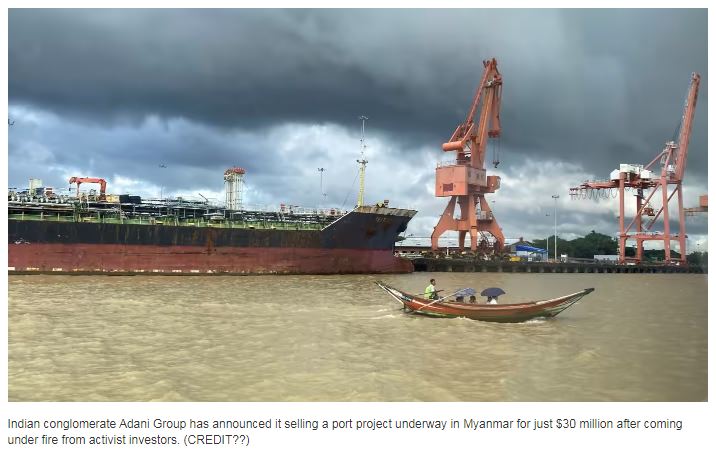Investors push foreign investors to rethink Myanmar projects
YANGON/BANGKOK — Pressure from investors concerned about environmental, social and corporate governance (ESG) issues, coupled with U.S. and European Union sanctions, is encouraging international companies to pull their cash out of Myanmar.
Indian conglomerate Adani Group announced the sale of a port project underway in Myanmar for just $30 million after critics said money from the project had been diverted to companies affiliated with Myanmar’s military, which ousted the country’s elected government in February 2021.
The project, undertaken by Adani Ports and Special Economic Zone, an Adani Group company, entails building a container terminal in Yangon, the country’s commercial capital.
Promising to invest $290 million, the company obtained approval for the project from the Myanmar Investment Commission in April 2019, when Aung San Suu Kyi’s National League for Democracy was governing the country.
Although the project is entirely private, the Indian government has been keeping a close eye on it as a counterbalance to China’s infrastructure development in Myanmar. New Delhi continues to engage with the military after the political change, as exemplified by the opening of the Indian government-backed Sittwe Port in Myanmar earlier this month.
But it is not easy for the private sector when foreign investors are involved.
Subsequently, it came to light that there were payments to the military-affiliated Myanmar Economic Corporation (MEC) in the form of leasing fees and other payments. Adani Ports and Special Economic Zone has drawn fire from Justice for Myanmar, an investigative group focusing on the military’s financial backing, which claimed the military would use the money to cement its rule.
“Adani Ports has failed in its corporate responsibility to respect human rights,” the group said in a March 2021 report, together with the Australian Centre for International Justice.
MEC is among the Myanmar entities targeted by U.S. and European sanctions. The sanctions do not apply directly to Adani Group but the Indian company has come under pressure from ESG-focused investors to withdraw from the project.
Moves by Norway’s Government Pension Fund Global, one of the world’s largest government-affiliated funds, which invests revenues from the country’s North Sea oil fields, are of particular interest.
In March 2022, Adani Ports was placed “under observation,” one step from exclusion from the fund’s investments, despite Adani Ports having announced its exit in October 2021. “There is significant uncertainty with respect to when such a withdrawal will be possible to implement,” the fund’s council of ethics stated in its recommendation.
Since Myanmar’s military assumed power, Norges Bank, which manages the fund, has announced a series of measures, including blacklisting companies that have dealings with the military.
Korea Gas and Gail (India) were excluded in April. An offshore gas field developed by their joint venture with Myanma Oil and Gas Enterprise was deemed to be funding the military and contributing to “serious violations of individuals’ rights as a result,” Norges Bank said.
Japan’s Kirin Holdings, which had a beer brewing operation in Myanmar through a joint venture with military-affiliated Myanma Economic Holdings (MEHL), was placed under observation in 2021. But Kirin was removed from the watchlist in March 2023 after the joint venture was terminated.
Initially, U.S. and the European Union sanctions targeted only the military and individuals affiliated with it. But their scope has since expanded to include private companies. More recent sanctions have a greater focus on companies importing weapons and jet fuel into Myanmar. That is because the military frequently launches attacks from the air using fighter planes and helicopters against armed rebels and pro-democracy groups.
In April, an airstrike on a meeting of a pro-democracy group in northwestern Myanmar’s Sagaing region reportedly killed more than 160 people. “If we can stop their procurement of fuel, many lives will be saved,” a source said.
During the previous period of military control in Myanmar, before the 2011 transition to democratic government, U.S. sanctions targeted most major local business groups and severely restricted investment in Myanmar and trade with the country. But this had serious side effects, causing women working in garment factories to lose their jobs, for example. The current sanctions are only meant to target the military and companies that have dealings with it.
Some members of pro-democracy groups have called for broader sanctions in hopes of forcing the collapse of Myanmar’s military government. But if large factories close, people already hit by higher prices may be unable to support themselves.
In April, Justice for Myanmar raised a question on the operations of Heineken, Carlsberg and ThaiBev, as they “are paying huge sums in tax.” Foreign companies that have invested in Myanmar are still considering what action to take after two years.
Source: https://asia.nikkei.com/Spotlight/Myanmar-Crisis/Investors-push-foreign-investors-to-rethink-Myanmar-projects


 English
English




